#Mainframe Staff Support
Explore tagged Tumblr posts
Text
winx if they were unnecessarily op to an insane level
bloom: since her powers are destructive she would be good on the offensive, she can generate and absorb heat basically making her to be a living furnace, as well as creating explosions, breathing fire, summoning the great dragon, and interacting with whatever form that fire can take, (magma, lava, etc)
stella: like bloom she can also generate heat bc their powers are similar and i think she would be an offensive fighter, she can call on the sun for more power and draw her energy from celestial bodies if she wishes, she could definitely blind someone with her light, she can also reverse her power completely and draw her powers from the moon (but i'd like to think she prefers the sun)
flora: good at crowd control and being a support, obviously she draws power from nature and can work with it to do whatever she likes, making comically large venus flytraps to subdue opponents, ridiculously large vines, but i think she can manipulate the earth itself, and can also create the opposite of life (decay) and uses forms of geokinesis if she really wants to (she doesn't bc she's a pacifist so she sticks to her leaves and plants)
aisha: hyper competent in battle and uses a shape shifting called morphix, we've seen her make pretty much everything there is to make cannons, staffs, gym equipment, a boat, i think if the situation's dire enough she could create a large body of water (probably an ocean) to become whatever she wants
musa: her power is so campy she could do anything honestly, i would say support or offensive but i think she can be whatever the situation calls for, girlie has created disco balls and speakers that basically play loud and discordant music to her enemies (probably made someone deaf at least once) uses echolocation, hear songs in everyone's heart which could be a psychic ability if you're creative enough, and she could definitely break the sound barrier if she wanted to
tecna: a strategist who uses her role in battle to get everyone to the best outcome, can manipulate laser grids and electricity to her advantage and can hack into any mainframe she wants and even enter into nonbinary codes, i would imagine she would be eons ahead of her enemies with her intelligence as well
8 notes
·
View notes
Text
How Generative AI Platform Development Is Transforming Legacy Systems into Smart, Self-Optimizing Digital Engines?
Legacy systems once defined the backbone of enterprise IT infrastructure. But in today’s fast-paced, data-rich environment, they often fall short—limited by rigid architectures, manual processes, and an inability to learn or adapt. Enter Generative AI platform development. This transformative technology is not just modernizing outdated systems—it’s evolving them into intelligent, self-optimizing engines that can learn, adapt, and improve with minimal human intervention.

In this blog, we explore how generative AI is breathing new life into legacy systems, unlocking hidden efficiencies, and enabling scalable innovation across industries.
Why Legacy Systems Hold Enterprises Back
Legacy systems—though critical to operations—were built in a different era. Many suffer from:
Inflexible architectures that are hard to scale or integrate.
Outdated programming languages with dwindling support.
Manual data processing prone to human error.
High maintenance costs with limited ROI.
Despite this, they contain valuable business logic, historical data, and infrastructure investments. Rather than rip and replace, enterprises are turning to generative AI to augment and future-proof their legacy assets.
What Is Generative AI Platform Development?
Generative AI platform development involves building AI-powered systems that can generate outputs—such as code, text, processes, or insights—autonomously. These platforms leverage foundation models, machine learning pipelines, and real-time data integrations to continuously evolve, improve, and adapt based on feedback and context.
When applied to legacy systems, generative AI platforms can:
Translate and refactor old code
Generate documentation for obscure processes
Suggest optimizations in real time
Automate routine operations
Personalize workflows across departments
Core Capabilities That Modernize Legacy Systems
1. AI-Driven Code Refactoring
One of the most powerful applications of generative AI is in automatic code translation. Using models trained on millions of code examples, platforms can convert COBOL or .NET systems into modern, cloud-native languages like Python or Java, reducing technical debt without manual reengineering.
2. Automated Process Discovery and Optimization
Generative AI can ingest data logs and legacy documentation to uncover workflows and inefficiencies. It then proposes process improvements, or even generates automated scripts and bots to optimize performance.
3. Smart Data Integration and Cleansing
Legacy databases often have siloed, inconsistent data. Generative AI platforms can unify these silos using data mapping, intelligent transformation, and anomaly detection—improving data quality while preparing it for analytics or AI applications.
4. Natural Language Interfaces for Old Systems
With generative AI, users can query legacy systems using natural language. This bridges usability gaps, eliminates training barriers, and democratizes access to business insights for non-technical employees.
5. Self-Learning Algorithms
Legacy platforms can now learn from past behavior. By feeding operational data into generative AI models, businesses can enable predictive maintenance, dynamic resource allocation, and AI-assisted decision-making.
Industry Use Cases: From Static to Smart
Finance
Banks with legacy mainframes use generative AI to automate compliance reporting, modernize core banking services, and enable real-time fraud detection—all without overhauling the entire tech stack.
Healthcare
Hospitals are integrating generative AI with EHRs to improve clinical documentation, identify anomalies in patient records, and automate repetitive tasks for staff—all while preserving critical legacy infrastructure.
Manufacturing
Legacy ERP systems are being enhanced with generative AI to forecast supply chain disruptions, recommend inventory restocking schedules, and reduce downtime using predictive insights.
Business Benefits of Generative AI for Legacy Modernization
Reduced Modernization Cost: Avoid the need for full system replacement.
Faster Time to Value: Improvements and automation can be deployed incrementally.
Enhanced Scalability: Systems adapt to increasing data volumes and business complexity.
Improved Employee Experience: Natural language and automation reduce cognitive load.
Future-Ready Infrastructure: Platforms become agile, secure, and cloud-compatible.
Challenges to Address
While generative AI is a powerful enabler, successful implementation requires:
Data governance: Legacy systems may hold unstructured or sensitive data.
Model alignment: Tailoring AI models to understand domain-specific processes.
Security protocols: Protecting integrated platforms from vulnerabilities.
Change management: Training teams to trust and collaborate with AI-enhanced tools.
These are surmountable with a clear roadmap and the right AI development partner.
A Step-by-Step Path to AI Platform Integration
Audit your legacy systems for compatibility, data quality, and usage.
Identify high-value use cases such as automation, reporting, or workflow enhancement.
Start small with pilots using generative AI for documentation, chat interfaces, or analytics.
Scale gradually across departments with platform-wide automation and optimization.
Continuously fine-tune models with operational feedback and human oversight.
The Future of Enterprise Systems Is Generative
Generative AI platform development is no longer experimental—it’s strategic. As more organizations shift from static operations to dynamic, AI-powered workflows, legacy systems will not be left behind. Instead, they’ll evolve into intelligent engines that power innovation, reduce costs, and unlock growth.
Whether you’re in finance, healthcare, logistics, or manufacturing, now is the time to transform your legacy foundation into a self-optimizing digital powerhouse.
0 notes
Text

Listing Reference: POST 06/08: ACCOUNTING CLERK: SUPERVISOR (5 X POSTS)Listing Status: Open Position Summary - Company: Department of Defence – Financial Management Division - Industry: Government / Public Sector - Job Category: Finance / Accounting - Location: Pretoria and Cape Town, South Africa - Contract Type: Permanent - Remuneration: R308 154 – R362 994 per annum (Level 7) - EE Position: Yes (Employment Equity principles apply) - Closing Date: Introduction The Department of Defence is inviting suitably qualified candidates to apply for the position of Accounting Clerk: Supervisor (5 posts) within the Financial Management Division. This opportunity is ideal for individuals with experience in finance and accounting, particularly within the public sector. The role involves overseeing financial management services, ensuring compliance with financial policies, and supporting budget management functions. If you have strong analytical skills, financial acumen, and experience in financial reporting, this position could be an excellent fit for you. Job Description The Accounting Clerk: Supervisor will be responsible for the provision of financial management services within the designated area of responsibility. This includes assisting in budget management, executing financial plans, and ensuring compliance with financial governance, risk, and compliance (GRC) requirements. Key Responsibilities: - Provide financial management services within the assigned unit. - Support the execution and monitoring of financial plans. - Ensure application of budget management policies and instructions. - Maintain and oversee the Financial Management System (FMS) operations. - Assist with financial matters related to processes and procedures. - Implement the Medium-Term Expenditure Framework (MTEF) in financial planning. - Participate in the preparation of the Estimate of Expenditure (EOE). - Ensure budget control and expenditure monitoring. - Provide financial reporting and ensure compliance with financial governance policies. - Implement internal controls and financial monitoring mechanisms. - Provide financial advice and guidance to relevant stakeholders. - Administer financial audit information and inquiries. - Ensure compliance with Occupational Health and Safety (OHS) standards in allocated facilities. Ideal Candidate The successful candidate must have a Grade 12 (NQF Level 4) certificate with 3 to 5 years of relevant experience in a finance environment. Alternatively, a National Diploma or Bachelor’s Degree in Finance/Accounting with at least 3 years of experience at Level 5 is preferred. Minimum Requirements: - Grade 12 (NQF L4) or equivalent qualification. - 3 – 5 years of relevant experience in finance/accounting. - Completion of applicable mainframe/system courses. - Understanding of financial management within the Public Service or Private Sector. - Knowledge of Public Finance Management Act (PFMA) and Supply Chain Management (SCM). - Proficiency in financial management systems and report writing systems (IC). - Knowledge of the Standard Chart of Accounts (SCOA). - Experience in Conventional Service Writing and staff work. - Familiarity with Departmental Accounting processes. Role Responsibility The primary role of the Accounting Clerk: Supervisor is to ensure sound financial management practices within the designated unit. This includes: Financial Management & Budgeting: - Implementing financial policies and frameworks. - Managing financial resources efficiently. - Assisting with budget formulation and expenditure monitoring. - Capturing financial data into the Financial Management System (FMS). - Ensuring budget adjustments are accurately reflected. Financial Compliance & Risk Management: - Monitoring financial transactions for compliance. - Supporting audit preparation and internal controls. - Investigating and reporting financial misconduct. - Contributing to risk management strategies. Financial Reporting: - Extracting and analyzing financial reports. - Distributing financial statements to relevant stakeholders. - Making recommendations based on financial reports. Operational & Administrative Support: - Managing financial documentation and recordkeeping. - Providing financial advice to department heads. - Supporting the preparation of the Annual Performance Plan (APP). Skills & Attributes Candidates should possess the following skills and attributes to succeed in this role: Technical Skills: - Strong knowledge of financial reporting systems. - Understanding of budget management principles. - Familiarity with government financial regulations and policies. - Experience using Microsoft Office (Excel, Word, PowerPoint). - Knowledge of Supply Chain Management (SCM). Soft Skills: - Excellent communication and interpersonal skills. - Strong analytical and problem-solving abilities. - High level of integrity and ethical conduct. - Ability to work under pressure and meet deadlines. - Detail-oriented with strong organizational skills. - Ability to manage multiple financial projects simultaneously. Application Process Interested candidates should submit their applications as follows: - By Post: Financial Management Division, DFSS, Career Management Section, Private Bag X137, Pretoria, 0001. - By Email: [email protected]. - Hand-Delivery: Poynton building, 195 Bosman Street, Pretoria (Wooden Post Box No. 5 at Reception). Enquiries: - Def Sec BMO: Mr. E. Ridgard – Tel: (012) 355 5510 - SA Army: Ms. T.M. Sekgobela – Tel: (012) 355 1238 - SA Airforce: Mr. S.R. Molekwa – Tel: (012) 312 2209 - SA Navy: Ms. R.E. Mamaguvhi – Tel: (012) 339 4220 Employment Equity Considerations The Financial Management Division is committed to employment equity and diversity. Preference will be given to African Males, African Females, Indian Males, Coloured Males, and Persons with Disabilities in line with the Employment Equity Act. Shortlisted candidates will undergo: - Practical Assessment: Technical and generic requirements evaluation. - Integrity Assessment: Oral examination, computer-based testing, and written evaluation. This is an exciting opportunity for finance professionals looking to advance their careers in the public sector. As an Accounting Clerk: Supervisor, you will play a crucial role in financial management, compliance, and budgeting. If you have the required qualifications and experience, don’t miss this chance to join the Department of Defence – Financial Management Division and contribute to South Africa’s financial governance. Apply now before the closing date! Read the full article
0 notes
Text
Top Coworking Spaces for Startups in Lahore
Lahore is the cultural capital of Pakistan and is gradually coming into the limelight as the country's innovative technology hub. With a growing startup culture, a diverse and active business community, and a history of trade and commerce, the city is an ideal environment for young businesses. One of the significant aspects of such growth is the presence of high-quality coworking spaces where startups can find all the necessary tools, openness, and support to thrive. In this article, the author takes a look at some of the finest coworking space providers in Lahore.
QuickOffice

QuickOffice distinguishes itself as one of the best coworking spaces in Lahore, suitable for startups and freelancers in particular who seek innovative and convenient work environments. QuickOffice is situated in a multiple commercial center in Lahore – like the main Gulberg and Upper Mall; therefore, it benefits from a central location close to the major businesses, food joints, and amusement sites. This coworking space includes internet connectivity, modern facilities, excellent meeting rooms and a relatively large event space. Members enjoy round-the-clock access and are actively engaged in community activities that allow them to connect with like-minded individuals and companies. Some of the advantages of joining QuickOffice shared office space include flexibility in membership plans, a professional atmosphere, and numerous networking possibilities; thus, it is ideal for startups.
COLABS

COLABS is one of the well-known coworking spaces in Lahore that provides a creative environment for people and has a more modern-looking interior. Located in Gulberg V, COLABS's vision create a work environment that fosters cooperation among startups, freelancers, and artists. These features include/user-friendly, appropriate open working station/ergonomic office space with new technologies for meeting purposes, a central gym, and a canteen. Day-to-day activities and periodic conferences and seminars provide good chances to make new connections and acquire more knowledge. The COLABS has a diverse community of people, new entrepreneur's mentorship programs, and aesthetic partnerships that enable startups to flourish.
Daftarkhwan

One of Lahore's most common coworking spaces is Daftarkhwan, which has multiple locations within Lahore with centres in Gulberg and DHA. Being oriented to start-ups, SMEs and freelancers, Daftarkhwan provides open-space workstations, tech-enabled conference rooms, unlimited bandwidth internet, and a pantry, among other amenities. There are offices for professional support staff to handle the everyday functioning of the organization. It allows members to select different locations, be in a favorable environment, and workshops/training sessions to obtain the essential skills.
Venture Drive

Venture Drive, located in the Model Town, is another well-known coworking space equipped with all the functional elements of a contemporary workspace, but it was developed in the format of a community-centered model. For startups, freelancers, and small businesses, Ventura Drive has fully furnished offices, meeting and conference rooms, high-speed fiber internet, and break-out areas. The supporting services include an administrative mainframe, while the support technologies include Information Technology services. Some factors that make Venture Drive unique include its one-stop-shop access, affordability, and focus on serving the community's interests of many business people.
The Hive

The Hive is one of the most luxurious coworking spaces today, situated in the heart of Gulberg, and its design is as efficient as it is beautiful. It supports startups and entrepreneurs in establishing and developing their businesses with ease. The Hive provides a flexible working area, technologically equipped meeting places, ordinary business get-together events, and a separate café. Easy access is flexible as it provides secure access for members around the clock. Due to its prime location, professional setup, and friendly community of members, The Hive is one of the best coworking places in Lahore.
Choosing the Right Coworking Space
In the current world economy, the best type of office or working space that your start up will take depends on one or many factors. Here are some factors to consider:
The concept of coworking spaces offers several choices, and QuickOffice is available in different price tiers. Select a plan suitable for your startup's financial capability, or choose the best plan for your business.
Accessibility is key. Consider how your team gets to work, and if distance to clients or other partners is a concern, incorporate it.
Other facilities include meeting rooms, internet access, photocopying services, and a recreation area. Determine which ones are essential for your startup business to function effectively.
The environment of the employees' workplace plays a role. Finding an environment that encourages people to work together could also lead to business relations and referrals.
As regards the choice of Lahore's coworking spaces, it is important to note that Lahore has a wide variety of coworking spaces to offer to startups and entrepreneurs. Moving from the highly personalized and networking-oriented QuickOffice to the collaborative and resourceful COLABS, Daftarkhwan, Venture Drive, and The Hive, there is a working space for everyone. Out of all these, QuickOffice is the best coworking space in Lahore because of its location, equipment, pricing options and, most importantly, its emphasis on community and networking. Given the future development of Lahore as one of the startup cities, such coworking spaces will be of great importance for the growth and development of the new generation of entrepreneurs.
1 note
·
View note
Text
I'm gonna have a time adding all this stuff to the wiki when I get my PC back. Till then, on with the Lore™!
On Level 3 of the Ghost Industries Ltd. R&D facility there is a large hangar that contains the mainframe for Maywaether, the central AI assistant to all members of the facility.
The mainframe's visual design is based on that of H.A.R.D.A.C. from Batman: The Animated Series episodes "Heart Of Steel" & "His Silicone Soul".
This mainframe actually has a dual purpose. To act as the central data storage system for the entire facility, and to provide the massive amounts of processing power Maywaether requires to execute their duties correctly and efficiently.
The mainframe also has four subframes dedicated to specific facility functions such as transport schedules, facility defences, major and minor life support systems, fire suppression and containment, etc...
All members of Ghost Industries Ltd. staff have their memories backed up to their host bodies through this system, with exception of the L.U.C.1.A.N Units. Their memories are backed up to an offsite storage database somewhere under the ocean.
1 note
·
View note
Text
How can mainframe managed services help in filling the IT talent gap?
Managed mainframe services can play a crucial role in filling the IT talent gap in several ways:
Access to Specialized Expertise: Managed service providers often have a team of experts with deep knowledge of mainframe systems. This allows organizations to tap into specialized skills and experience they may not have in-house.
Scalability: Managed services can scale up or down as needed, ensuring that an organization has access to the right level of support without the need to hire and train full-time staff.
Cost Savings: Managed services often provide a cost-effective alternative, allowing organizations to pay for the services they need without the overhead of full-time employees.
24/7 Support: Many managed service providers offer round-the-clock support, which is crucial for mainframes that are often used for critical business operations. This ensures that issues can be addressed promptly, minimizing downtime and disruptions.
Focus on Core Competencies: By outsourcing mainframe management to a specialized provider, organizations can free up their internal IT teams to focus on strategic projects and core competencies rather than getting bogged down in day-to-day mainframe operations.
Risk Mitigation: Managed service providers often have robust disaster recovery and security protocols in place. This can help organizations mitigate the risks associated with mainframe operations, ensuring data integrity and compliance with industry regulations.
Knowledge Transfer: Managed service providers can also facilitate knowledge transfer to the organization's internal IT team. This can help in-house staff develop their skills and become more self-sufficient over time.
Flexibility: Mainframe-managed services can be tailored to the specific needs of the organization. Whether it's routine maintenance, troubleshooting, or capacity planning, these services can be customized to address unique challenges.
Rapid Adoption of Technology: Managed service providers are often at the forefront of technological advancements in the mainframe space. By working with them, organizations can quickly adopt new technologies and best practices without the need for extensive training or hiring efforts.
Compliance and Governance: Managed service providers are typically well-versed in industry-specific regulations and compliance requirements. They can help ensure that mainframe operations adhere to these standards, reducing the risk of non-compliance and associated penalties.
In summary, mainframe managed service providers can help organizations bridge the IT talent gap by providing access to specialized expertise, scalability, cost savings, and a range of other benefits. This allows organizations to effectively manage their mainframe systems while focusing on their core business objectives.
0 notes
Text
The Power of AI in Government Data Analysis

Few technologies ruled the globe as AI has in recent years. Public debate of AI and its various application cases has expanded beyond computer specialists. In the next years, generative AI might alter society, enhance productivity, and generate billions in economic value.
AI’s benefits go beyond commercial and consumer goods. AI can transform government services when applied responsibly with properly controlled technology, privacy protection, and transparent and explainable decision making. These services may empower individuals and restore faith in public institutions by boosting staff efficiency and lowering operational expenses. AI may also accelerate digital modernization by automating legacy software migration to cloud-based apps or mainframe application modernization.
Despite its numerous benefits, many government organizations are still learning how to apply AI, especially generative AI. Global government entities often have an option. They may embrace AI and its benefits to better residents’ lives. Or they may wait and lose out on AI’s capacity to assist agencies achieve their goals.
Early adopters of AI and automation solutions, such as modernizing the IRS tax return processing or improving the U.S. Agency for International Development’s Global Health Supply Chain Program, provide clear evidence of the technology’s public sector benefits. Virtual assistants like the one produced by the Ukranian Embassy in the Czech Republic to enlighten Ukrainian residents are other successful AI deployments. New AI with generative AI models may be the next big opportunity for governments to use AI.
Three key areas of attention
Government agencies must concentrate on the primary areas where AI use cases might assist them and their customers to get there. We see three primary sections.
The first is digital labor or workforce transformation. Public personnel must be AI-ready at all levels of government, from national to local. That may include employing data scientists and software engineers, but it should also involve educating current employees to manage AI projects. Since natural language processing (NLP) may reduce text data reading and analysis, productivity can increase. The idea is to provide public workers time for high-value meetings, innovative thinking, and meaningful work.
The second priority is public support. The public sector must prioritize citizen-benefitting AI use cases for society to benefit. It might be used to provide real-time information, personalize services to citizens’ requirements, or speed up sluggish operations. Anyone who has had to submit documentation or a claim understands the feeling: Spending hours at an office waiting for staff to click through various screens to find information in different databases. What if AI’s capacity to acquire, organize, and exploit data could unlock data across agencies to provide information and services more naturally and proactively, boosting even online government offerings?
Third, public sector digital transformation is increasingly reliant on AI. Legacy systems with closely connected workflow rules that take considerable time and money to update prevent governments from really transforming. Public sector entities may improve data utilization by moving technological systems to the cloud and adding AI. AI-powered technologies can create computer programs and find patterns in massive data sets. This may help optimize costs and improve cybersecurity by detecting threats promptly. Agency skills gaps may be closed by tapping into growing talent instead of hard-to-find abilities.
Responsible AI commitment
IBM has long promoted ethical use of technology throughout its lifecycle of design, development, use, and maintenance, and no discussion of responsible AI in the public sector is complete without it. Government and public sector firms must compete with healthcare and financial services businesses for confidence. Humans should remain at the center of government services while overseeing responsible deployment using the five core qualities of trustworthy AI: explainability, fairness, transparency, robustness, and privacy.
Explainability: An AI system’s ability to explain its forecasts and insights to the public without technical jargon.
Fairness: A system’s capacity to treat people or groups fairly, depending on the situation, to fight prejudices and address discrimination based on protected criteria including gender, color, age, and veteran status.
Transparency: An AI system’s capacity to disclose its design, development, and data sources.
Robustness: An AI system’s capacity to tolerate anomalous input to provide consistent results.
Privacy: An AI system’s capacity to prioritize customer privacy and data rights and comply with data collecting, storage, access, and disclosure standards.
If implemented with all the aforementioned features, AI may aid governments and people in innovative ways. Range may be AI and fundamental models’ largest benefit: Even tiny organizations might be affected. State and local government initiatives may utilize models to enhance how staff and residents explore databases for regulations and benefits. By keeping educated, accountable, and AI-savvy, the public sector can help improve the future for everybody.
IBM will use foundation models and generative AI to solve high-stakes problems. Our open and tailored AI solutions create value for enterprises and public entities. IBM watsonx, our integrated AI and data platform, deploys AI seamlessly, efficiently, and responsibly across many settings. IBM is ready to empower governments with AI. Join us in the AI value creation era.
0 notes
Link
Maintec provides organizations the flexibility, cost effectiveness and quality they need to achieve mainframe support and operations excellence, by leveraging our skilled staff and onshore data center in Raleigh, North Carolina. Maintec also provides a wide range of data center services, including z/OS, Linux and IBM i systems administration and programming.
1 note
·
View note
Text
Fallout DC AU That No One Asked For!
Bruce:
· 38 years old.
· Descendants of Vault Dwellers who trace their line back before the war to high-class citizens, extremely wealthy, some even higher up members of Vault Tech (hence why they were able to secure a Vault perfected to their desires).
· Vault did not interact with outside world for centuries until Thomas Wayne decided to provide medical care to the outside world.
· Bruce routinely went with Thomas and Martha to settlements that needed treatment, but unfortunately, saw his parents slain by raiders after they’d managed to hide him and give him their Pip-Boys. Escaped and followed the map back to the Vault, telling others what occurred.
· Started training with weaponry and bodily to essentially wage war on criminal activity in the Commonwealth.
· Highly skilled in usage of rifles, knives, and hand-to-hand combat
· Designated No-Kill Rule of civilians and synths, enemies or those who engage despite repeated warnings are.
Dick:
· 25 years old.
· Son of traveling merchants/entertainers who were killed by gang warfare when they refused to pay a “travel-safe” fee.
· Rescued by Bruce whenever he was found trying to avenge his parents’ deaths.
· Taken back to Vault and raised by Bruce.
· Routinely tried to strike out on his own but was always tailed by Bruce.
· Joined Minutemen at 17, returned to Vault at 21 after the Quincy Massacre.
· Highly skilled in dual, electrified Assaultron blades, hand-to-hand combat, and handguns.
Jason:
· 21 years old.
· Son of a raider and a chem addict, both of whom died in respective ways.
· Survived by joining raider camps and fighting for food and supplies when he could, or he would go to Goodneighbor and do odd jobs for caps.
· Ran into Dick and Bruce when the two were casing a super mutant camp and he was planning on sneaking in and stealing supplies.
· Literally dragged back to the Vault because he did not want to go after hearing horror stories of Vault dwellers being subjected to experiments.
· Very suspicious of Bruce and Dick and ran often, only to be found by Dick or Bruce and once by Alfred who lured him out of a tree by offering cakes and a book.
· Highly skilled in most weaponry though favors assault rifles/sniper rifles, hand-to-hand combat, and knives.
Tim:
· 18 years old.
· Son of Vault Dwellers who belonged to the same Vault Bruce does, though their families never interacted given the hierarchy status of the Wayne’s being higher than the Drake’s.
· Extremely intelligent as a child, topped classes and had a budding talent for electronics and hacking.
· Parents were killed in a synthetic scare when he was nine.
· Routinely sent to Overseer’s office for hacking Vault mainframe and sneaking into locations not permitted to be entered by civilians—mainly computer areas and research labs.
· Followed Bruce and Jason (Dick was with Minutemen) one night and managed to hack enemy’s building security, providing fire-support through the turrets set up.
· Bruce found out and re-registered Tim Drake as Tim Wayne, allowing Tim to come into the family.
· Highly skilled in hacking, hand-to-hand combat, usage of modified, extendable shock gravity baton that becomes a staff.
Duke:
· 19 years old.
· Son of Railroad members who operated near Quincy. When the attack occurred, Dick managed to get Duke and his mother out and to the Vault safely.
· Previous generations of family members belonged to the Children of Atom, making Duke’s genetic makeup different than the average human alive; can withstand radiation and has a very uncanny ability to tell when a rad-storm is about to start brewing along the sky.
· Because of the withstanding to radiation and the generations of continual exposure to radiation, Duke’s body has evolved, especially with the added trauma of the Quincy Massacre, his body has unleashed evolutionary abilities that include:
o The ability to manipulate the way his eyes process light, he can “see” through walls and see natural radiation in living beings’ bodies.
o Manipulation of natural radiation in environment and bodies to either amplify effects or negate them.
o Accelerated healing
· Through trained thoroughly by Bruce and his siblings, prefers to tag along with the group and write their exploits and occasionally send them to Publick Occurrences, though has been known to go out with Tim on missions.
· Highly skilled in hand-to-hand combat, dual bladed-tire irons connected with a welded chain, and energy weapons.
Damian:
· 14 years old.
· Son of Bruce Wayne and Talia al Ghul, a descendant of an old war assassin’s guild; conception date unknown, but Talia was a resident of the Vault for some time before she returned to her home.
· Genetically modified as a fetus to be perfect in every category of life after birth, including health, athleticism, leadership, education, etc.
· Born in the territory formerly remembered as the Arabian Peninsula; the guild still resides in the ancestral territory where it was first founded.
· Brought to Bruce after worrying circumstances forced Talia to evacuate the city, leaving Damian in his care.
· Hates being stuck in a Vault, cares for siblings and his great dane Titus and that’s about all he cares about.
· Exceptionally versed in old world knowledge and languages, including some ten thousand years before initial bomb drops.
· Highly skilled with blades of all kinds, hand-to-hand combat, and some guns.
· Occasionally recreates artistic renditions of Duke’s exploits.
Alfred:
· A former Mister Gutsy revamped to work as a Mister Handy and essentially a butler for the Wayne family throughout the generations.
· Skilled in combat, medicine, science, and technology, though rarely leaves Vault.
· Takes care of the “Wayne” section in the Vault, has for almost two centuries and has known developed a more sentient mind the more he evolves his own processing, uses this evolution to produce sarcastic responses to most of Bruce’s suggestions.
· Responsible for raising and training Bruce and many of the other children who have come into the Vault with Bruce.
· Does not like messes in his kitchen area and will pinch if tracked down correct mess maker—it’s usually Bruce.
· Spent and continues to spend every night reading old world stories to the Wayne’s, many including The Great Gatsby, Don Quixote, Edgar Huntly, Moby Dick, Hamlet, The Divine Comedy, Wuthering Heights, Pride and Prejudice, One Thousand and One Nights, Leaves of Grass, Poems by Phillis Wheatley, and many others. (Jason is always very excited about this and hoards copies of any book he finds on personal digs.)
#fallout au#batfamily au#batfam au#batfamily#batfam#bruce wayne#dick grayson#jason todd#tim drake#duke thomas#damian wayne#alfred pennyworth#dc au#dc comics au#dc#dc comics#au#batman#nightwing#red hood#red robin#the signal#signal#robin#batfamily imagines#batfamily imagine#batfam imagine#batfam imagines#fallout#fallout 4
36 notes
·
View notes
Text
Denki Kaminari: Accidental Epileptic Icon

[ID: A digital drawing of Denki Kaminari from My Hero Academia. He has a bi grin on his face as he gives out two peace signs. He is wearing a Purple TShirt that says “THIS IS WHAT A DISABLED PERSON LOOKS LIKE” on it.]
By this point I think I may just be becoming an Epileptic!Kaminari blog, but since the DVD/BluRay just came out I thought I'd cross-post from my Fandom Twitter about why I am so passionate about this headcanon.
There have been plenty of electricity based Superheroes in the past: Static, Black Lightning, Surge, and Thor to name but a few. What marks Denki apart though is the intense NEGATIVE side effects his power has.
There's a trap writers often fall into when creating disabled heroes, where the hero's disability actually grants them some immense power e.g.: Daredevil's superior hearing and reflexes. Denki's quirk does not make his life easier, but much like kids on meds, he's learnt to control it. Mostly.
When Denki releases a sudden and much too intense amount of electricity his brain short circuits, causing him to lose some level of brain function. His dopey expression and dropped gaze could be read as a variety of seizure types. I go with Absence, coz I'm a narcissist.
Not only this, but Denki's "Derp Mode" contains many of the symptoms of a Postictal State ("the altered state of consciousness after an epileptic seizure"). These include, but are not limited to: drowsiness, confusion and headaches. Again, sound familiar? Now, if I believed this was a DELIBERATE attempt at representation I'd be frustrated and a little insulted. There are problematic elements within his "Derp Mode", but when you're epileptic you take what you can get. Which is… overall? Not a lot.
Seriously, take a second to try and think of, say, three explicitly stated epileptic characters in mainstream media... Pretty tough, huh? Even Google can't really help you. Our representation is mostly limited to murder victims.
"How did he die?"
"Well, the super computer didn't like that he tried to turn it off, so it flashed lights at him until he had a seizure and died!"
This is an actual plot line from Elementary. Yeah. It sucks. Back to anime!
Denki's struggle for control is what makes him relatable. He has episodes during regular classes that detract from his learning. His friends make fun of his "derp mode", the period where he's the most vulnerable. These aren't NICE things, but they are all too relatable. He could be criticised for taking too many risks, and trying to use too much of his power at once without thinking it through. This is what we experts call "being a teenager".
From my personal experience, your teen years are when you start to really discover what your triggers are. You try to push yourself, find where your limit is and maybe even try to rebel against it. Perhaps with enough practice you can break those limits and be cured! (Spoiler: You can't be.)
Pushing limits could mean: not taking your medication, staying up late, watching films with flashing lights etc. So when I see Denki being too gun-ho about using his quirk- that's what I see: a teenager testing his limits and making mistakes.
But I also see him LEARNING from those mistakes. He pushes his voltage limit up slowly, testing it in a safe environment with support staff around. He has aids to help refine his technique and prevent overload. His level of self-control from Two Heroes to Heroes Rising is remarkable!
So that brings us back round to the film, and why I cried in the cinema, admittedly on my 4th watch. (I had a pass. I made the most of it.) The answer is: Kaminari knowingly and painfully pushing his limit to save the island. Specifically I am talking about the scene where the power has gone out across the island, and it is Kaminari's job to charge the emergency batteries Momo created to bring power back to mainframe units.
We see him and Momo struggling to produce these generators. They require more energy than they possess, but without them they're doomed. When Jiro suggests they take a break Denki replies "If I don't charge these [batteries] now I won't get to"
This hit home. I have been in that situation. I've had to pull an all nighter. I've had to wake up too early, too often. I've been so stressed that I can feel the tell tale signs of a seizure on the horizon… but I had to push through it. Once that feeling of an oncoming seizure begins there is no taking a break. There is no five minute gap, I have to complete my tasks, be it handing in coursework or stacking shelves, right then coz I'm gonna be flat on my bed in 10 minutes regardless.
That's what I saw in Denki, and in Momo. The familiar pain of knowing the worse is coming, knowing there's nothing you can do, but the pressure of the immediate task means you can't stop. All because, for you, pushing your limits has deadly consequences. For the first time we saw Denki's "Derp Mode" played as a consequence with little to no comedic element. This wasn't "Silly Denki thinking he can do it all! No he can't!" or "Look at his derpy face, how funny it is so make him suffer!"
Denki's loss of awareness was a sign that he had been acting as a hero. He'd given his all for his friends and the islanders. In his next scene we saw him attending a meeting in a Postictal State. He has nothing more to give, but he was still included in the group.
I've never really seen that before. I've never been given a chance to explore those feelings through media. It made me process my life and my choices. Through Denki's extraordinary situation, I was able to look at my ordinary life more clearly.
Denki was me. Denki was me age 10 missing things in class and thinking I was an idiot. He was me age 14, losing friends because they thought I was ignoring them. He was me age 19 at Uni, hiding under a desk during hand-in because my brain couldn't cope anymore. He was me age 24 realising I had to quit my retail job because I couldn't keep up with the long hours; my seizure count going from 1 a month to 3 a day. He's me age 26 crying as I write this.
Representation matters. Seeing yourself represented let's you understand parts of your life you never got to before. It helps you feel seen, like your struggles matter to other people. Denki isn't perfect, but he’s all we have. And I love him.
#Actually Epileptic#My Hero Academia#Denki Kaminari#Epilepsy#BNHA#Heroes Rising#My Hero Academia Heroes Rising#Boku No Hero Academia#Boku No Hero Academia Heroes Rising#Spoonie#Anime#Headcanon#Media#Meta#Blog Post
120 notes
·
View notes
Text

1. FNB Information Security Administrator Job Introduction: First National Bank (FNB), a leading financial institution in South Africa, is seeking a skilled and experienced Information Security Administrator (Mainframe) to join their dynamic team in Johannesburg. This is a full-time position with a closing date for applications set for February 11, 2025. If you are passionate about IT security, have a strong background in mainframe systems, and thrive in a collaborative environment, this role is tailor-made for you. FNB is renowned for its innovative approach to banking and its commitment to fostering a culture of curiosity and adaptability. As part of the FNB team, you will work alongside diverse minds and unique talents, contributing to the bank’s mission of delivering exceptional products and services. The world of technology is evolving rapidly, and with it comes the increasing need for robust cybersecurity. As one of South Africa's leading financial institutions, First National Bank (FNB) is at the forefront of innovation and security. To uphold its reputation as a trusted financial partner, FNB is on the lookout for a dedicated Information Security Administrator to join its ranks. About First National Bank (FNB) FNB is known for its innovative financial solutions and customer-centric approach. As part of the FirstRand Group, FNB has built a reputation for excellence, resilience, and leadership in the financial sector. Its emphasis on employee development, cutting-edge technology, and customer satisfaction makes it a preferred employer for professionals seeking rewarding careers. The Information Security Administrator is a critical role within the bank's IT and security departments. This position focuses on protecting FNB’s data assets and IT infrastructure from cyber threats, unauthorized access, and data breaches. Role Responsibility: As an Information Security Administrator, you will play a critical role in safeguarding FNB’s information systems and ensuring compliance with industry standards. Your responsibilities will include: - Policy Development and Maintenance: - Assist in identifying, defining, and maintaining the information security policy and baseline standards for FirstRand. - Ensure compliance with legislative and audit requirements. - Risk Awareness and Stakeholder Engagement: - Support IT Security leaders in promoting information risk awareness across the organization. - Cultivate and manage relationships with stakeholders, including end-users, SMEs, project managers, and senior staff. - Control Mechanisms and Reporting: - Administer the implementation of control mechanisms to monitor the status of information security within FirstRand. - Capture, record, and report on all information security analysis and research to ensure proper execution of actions. - Operational Excellence: - Deliver exceptional service by providing proactive, innovative, and appropriate IT security solutions. - Ensure operating objectives and performance standards are understood and owned by management and employees. - Continuous Learning: - Stay updated on emerging technologies and trends in the information systems security industry. - Manage personal development to enhance skills and competencies. Effective Management of Staff In this role, you will be expected to lead and inspire your team to achieve shared goals. Effective staff management involves: - Providing clear guidance and support to team members. - Encouraging collaboration and knowledge sharing. - Fostering a culture of accountability and ownership. Effective Management of Operations Operational efficiency is key to the success of the Information Security team. Your responsibilities will include: - Streamlining processes to enhance productivity. - Ensuring timely execution of tasks and projects. - Monitoring and optimizing resource allocation. Effective Management of Business Development Function As an Information Security Administrator, you will contribute to the growth and development of the business by: - Identifying opportunities to enhance IT security measures. - Collaborating with other departments to align security strategies with business objectives. - Driving innovation in information security practices. The Ideal Candidate: FNB is looking for a candidate who embodies the following qualities: - Experience: - 3 to 5 years of experience in a similar environment. - Non-negotiable mainframe experience. - Skills and Attributes: - Collaborative: Works well with others to achieve shared goals. - Analytical Thinker: Capable of analyzing complex problems and developing effective solutions. - Proactive: Takes initiative to address challenges and improve processes. - Detail-Oriented: Ensures accuracy and precision in all tasks. - Adaptable: Thrives in a fast-paced and ever-changing environment. - Technical Expertise: - Strong understanding of information security principles and practices. - Proficiency in mainframe systems and related technologies. - Knowledge of industry standards and regulatory requirements. Why Join FNB? FNB is more than just a bank; it’s a hub of innovation and collaboration. By joining the FNB team, you will: - Work in a supportive and inclusive environment that values diversity. - Have access to opportunities for professional growth and development. - Contribute to meaningful projects that make a difference in the lives of customers. - Be part of a culture that encourages curiosity, adaptability, and excellence. The role of an Information Security Administrator (Mainframe) at FNB is a unique opportunity to make a significant impact in the field of IT security. With a focus on collaboration, innovation, and excellence, FNB provides the perfect environment for professionals to thrive and grow.If you have the required experience, skills, and passion for information security, don’t miss this chance to join one of South Africa’s leading financial institutions. Apply today and take the first step toward a rewarding career with FNB! Apply here 2. FNB Financial Administrator Role in Cape Town - Apply Now! Job Introduction: First National Bank (FNB), one of South Africa’s most reputable financial institutions, is seeking a dedicated and efficient Financial Administrator to join their team in Cape Town. The role provides a great opportunity for those interested in financial administration within a dynamic, supportive environment. This is a contract position offering you the chance to contribute to FNB’s mission of delivering excellent service and ensuring the smooth running of financial processes. The Financial Administrator will be responsible for maintaining accurate records of financial transactions, managing payments, and handling invoicing within agreed timelines. This is a crucial role that helps ensure business units maintain proper financial administration, contributing to the overall operational success of the bank. Role Responsibility: As a Financial Administrator at FNB, you will be tasked with a range of responsibilities aimed at maintaining financial order and ensuring timely execution of financial tasks: - Maintain Accurate Financial Records:You will oversee the accurate and up-to-date documentation of all financial transactions within the business unit. This includes daily, weekly, and monthly financial recordkeeping, ensuring that all records are accessible and compliant with internal standards. - Managing Payments and Invoices:One of your key responsibilities will be to manage payments and invoicing within the agreed-upon timelines. This includes both incoming and outgoing payments, ensuring that all financial obligations are met on time. - Administer Day-to-Day Finances:You will manage the daily finances of the business unit, working with various business processes, systems, and procedures to ensure seamless financial operations. This includes budgeting, expense management, and liaising with relevant departments for financial clarity. - Customer Dispute Resolution:In this role, you may be tasked with managing and resolving customer disputes related to ATM/ADT devices, ensuring that customers receive a positive experience and that issues are handled swiftly and efficiently. - Excel Experience:Proficiency in Microsoft Excel is essential, as you will be required to handle large datasets and perform financial reconciliations and analysis efficiently. - Adherence to Policies and Procedures:You will follow company policies and procedures to manage costs effectively, ensuring compliance with FNB’s internal controls and financial guidelines. - Contribute to Service Excellence:FNB is known for its customer-first culture, and you will play a key role in helping maintain this reputation by ensuring accurate financial processes are upheld. By providing timely feedback and exceptional service, you will contribute to the overall success of the business unit and customer satisfaction. Effective Management of Staff: Although this position does not involve direct staff management, you will work closely with various teams across the business unit, helping ensure the smooth flow of financial information and providing necessary support where required. Effective Management of Operations: As a Financial Administrator, your ability to efficiently handle day-to-day operations is crucial. Your work will directly impact the department’s operations, ensuring that all financial processes are executed seamlessly, reducing operational disruptions and financial discrepancies. Effective Management of Business Development Function: While the primary focus is financial administration, you will indirectly contribute to the business development function by ensuring that the financial health of the business unit is maintained. This will, in turn, support growth opportunities and business expansion initiatives. The Ideal Candidate: FNB is seeking a candidate who is detail-oriented, organized, and capable of managing multiple financial tasks simultaneously. The ideal candidate will have a strong background in financial administration and be ready to take on new challenges in a fast-paced environment. - Educational Qualifications:A relevant qualification in finance, accounting, or a similar field would be advantageous. The candidate should possess strong financial knowledge and be comfortable with financial recordkeeping, invoicing, and transaction management. - Experience:Previous experience in a financial administration role, or a similar position, would be beneficial. Any experience with ATM/ADT device reconciliation or dispute management will be considered an advantage. - Skills & Attributes:The candidate must exhibit strong communication skills, both verbal and written, and should have a proactive attitude to resolving financial issues. You should be comfortable working independently while also being an effective team player. Exceptional attention to detail, organizational skills, and a strong understanding of financial systems will be essential for this role. - Technology Skills:Proficiency in Microsoft Excel is a key requirement for this role. You should be able to manage large datasets, conduct financial analyses, and maintain accurate spreadsheets. - Personal Traits:The ideal candidate should possess excellent problem-solving skills and be comfortable managing financial discrepancies and resolving customer disputes. A customer-first mentality and the ability to handle sensitive financial matters with discretion will be vital for success in this role. Skills and Attributes: The following key skills and attributes are essential for success in the Financial Administrator position at FNB: - Attention to Detail: Accuracy is paramount in financial administration. You will need to ensure that all financial records are correct, which requires an eye for detail and the ability to identify errors in financial data. - Proactive Communication: The ability to communicate clearly and proactively is essential, whether you are working with internal teams, resolving customer queries, or addressing potential financial discrepancies. - Problem-Solving: You should be capable of troubleshooting issues related to financial transactions, ATM/ADT disputes, and customer concerns. - Customer Service: FNB is a customer-centric organization, and providing excellent customer service is at the heart of this role. You should have the ability to handle inquiries professionally, offering timely resolutions to customer concerns. - Time Management: Effective time management is crucial to meet deadlines, process financial transactions promptly, and manage a variety of financial tasks each day. Additional Information: - Advantageous Skills:Experience with daily reconciliation of ATM/ADT devices and managing disputes related to ATM/ADT devices is advantageous for candidates applying for this role. - National Credit Act (NCA):Candidates applying for this role will be required to undergo a credit record check in accordance with the National Credit Act (NCA). - Contract Position:Please note that this is a contract position, offering an opportunity to work within FNB’s high-performance environment for a limited period. How to Apply: If you meet the above requirements and are eager to contribute to a leading financial institution, apply for the FNB Financial Administrator position today! Be sure to submit your application before the closing date on February 19, 2025. To apply, follow the instructions on the official FNB job portal. Only shortlisted candidates will be contacted for further steps in the recruitment process. The FNB Financial Administrator position offers a unique opportunity for individuals looking to enhance their career in financial administration. With competitive responsibilities and the chance to work with one of South Africa’s most respected banks, this is an excellent role for those with a passion for finance and customer service. Apply today and take the next step in your career with FNB! Apply here 3. FNB Administrator Vacancy: Unlock Your Potential with FNB Loans Are you ready to be a part of an innovative team where your efforts will shape the future of financial services? First National Bank (FNB) is looking for an experienced Administrator to join their dynamic FNB Loans team. If you are passionate about administration, customer service, and financial services, this could be your opportunity to thrive in a role where your contributions will truly make a difference. Job Introduction: The FNB Administrator will be responsible for providing efficient and effective administration support to ensure the smooth running of a functional area within the FNB Loans team. This is a full-time position located in Cape Town, and the closing date to apply is February 13, 2025. With only a few days left to submit your application, don't miss out on the chance to become part of a team that is designed to shape and transform the financial services industry. Role Responsibility: As an FNB Administrator, you will be expected to take on a variety of key responsibilities to support the smooth running of the department. Your duties will include: - Administration Support: - Provide day-to-day administrative support for the department, ensuring that all processes are executed accurately and on time. - Set up and maintain efficient filing systems for the business unit to enhance productivity. - Support the operational activities of the department through the maintenance of administrative processes. - Cost and Budget Management: - Manage costs and expenses within an approved budget to ensure cost efficiencies and align with financial goals. - Monitor expenses, keeping them within the approved budget to maximize the department’s financial health. - Stakeholder Management: - Cultivate and manage positive working relationships with various stakeholders, including end-users, subject matter experts (SMEs), project managers, and senior staff members. - Ensure effective communication and collaboration across different departments to drive operational efficiency. - Customer Service Excellence: - Resolve all customer queries efficiently and within agreed timelines, ensuring a high level of customer satisfaction. - Deliver exceptional service by providing proactive, innovative, and appropriate solutions to meet customer needs. - Compliance and Governance: - Keep abreast of changes in laws, regulations, initiatives, and relevant industry practices. - Ensure compliance with governance and legislative requirements, adhering to audit standards. - Draft and implement interventions in response to changes in the regulatory environment. - Performance and Development: - Plan and manage performance, focusing on skills development, employment equity, and talent management. - Improve innovation, operational efficiency, and team competencies by fostering a culture of continuous learning. - Manage personal development to enhance your own competencies and grow within the organization. - Management Information: - Provide timeous and accurate management information to assist in decision-making and support strategic initiatives. The Ideal Candidate: To be successful in this role, the ideal candidate must demonstrate both experience and specific qualifications. The following attributes are essential for the role: - Educational Requirements: - A minimum of a Matric certificate (Grade 12) or a relevant qualification. - Experience: - At least 2 to 5 years of experience in administration within the financial services industry. - Knowledge of FNB LIFE, Insurance, and Credit Life is highly advantageous. - Experience working with loan products or revolving credit will be beneficial. - Proficiency in DA systems is considered an advantage. - FAIS Compliance: - FAIS compliant in terms of "fit and proper" requirements. - Possession of the RE 5 (Representative) certification is mandatory. - Skills and Attributes: - Excellent administrative and organizational skills. - Strong communication skills to effectively liaise with stakeholders at all levels. - Ability to work independently and manage multiple tasks simultaneously. - High level of adaptability and curiosity to thrive in an ever-evolving industry. - Ability to analyze complex data sets and provide actionable insights. Why Apply? FNB is not just a bank; it’s a place where you can continuously grow and evolve. The culture at FNB Loans encourages adaptability, curiosity, and continuous learning. This role offers you the chance to be part of a diverse and dynamic team that values the contributions of each individual. FNB provides an environment where your talents are nurtured and your career progression is a key focus. If you have a passion for the financial services industry, excellent administrative skills, and the drive to make a difference, this is the ideal opportunity for you. How to Apply? Interested candidates are encouraged to apply as soon as possible, as the closing date is fast approaching. Here’s how you can apply for the FNB Administrator position: - Visit the FNB Careers Page: Go to the FNB job portal and search for the Administrator vacancy (Job ID: R28432). - Complete the Application Form: Ensure that you fill in all required information accurately and attach your updated CV. - Submit Your Application: Once completed, submit your application before the deadline of February 13, 2025. Read the full article
0 notes
Text
FIC: Smoke and Mirrors - Chapter 18
Title: Smoke and Mirrors Fandom: SWTOR Pairing: Theron Shan/f!Jedi Knight Rating: T Genre: Pre-Relationship, Slow Burn Synopsis: Something’s rotten on Carrick Station, and Theron won’t rest until he finds out what. But picking at the frayed threads of suspicion quickly unravels a conspiracy much larger than even the Republic’s top spy can handle on his own. (A mostly canon-compliant retelling of the Forged Alliances storyline, as seen through the eyes of Theron Shan.) Author’s Notes and Spoilers: See Chapter 1.
Chapter Index: 01 | 02 | 03 | 04 | 05 | 06 | 07 | 08 | 09 | 10 | 11 | 12 | 13 | 14 | 15 | 16 | 17 | Crossposted to AO3

The Heorum Complex technically stayed open twenty-four hours a day, because intelligence work never slept. However, the office experience varied wildly depending on the time of day. In the daytime, it was abuzz with activity. Agents sat at terminals working through reports and intel, analysts dutifully sorted through the steady stream of data being fed in from across the galaxy, and all the office support staff bustled about in the typical work day grind. The aroma of fresh-brewed caf would sometimes waft from the various kitchenettes and a constant background buzz of chatter filled most of the rooms.
Nighttime was a decidedly different mood. Darkened terminals and stations replaced the bustle of workers, doused in shadow after the overhead lights switched off for the evening. The shadows of the abandoned desks and chairs stretched across the empty rooms, like long, spindly fingers reaching out. The hum of constant chatter gave way to the clank and hum as the cleaner droids made their rounds on each floor. The sharp, antiseptic scent of the droids’ cleaning solution would overpower everything else. It was almost as sharp and jolting as a steaming mug of caf, although not nearly as pleasant to take in.
If Theron were being honest, a steaming mug of caf wouldn’t go amiss right now. He needed to focus and had a long, grueling task ahead of him.
Tonight wouldn’t be the first night that he’d lost track of time and been the last one out — although the previous instances were unintentional. Today he’d made a show of getting too absorbed in his assignment; decoding some intercepted transmissions from an Imperial base that Marcus wanted a rush on. Theron had cracked the cipher earlier in the day, but feigned ignorance to draw out his time on the terminal as long as possible. He’d grabbed a station in the far corner of the room where no one could easily sneak up on him and spy the second set of coding he was working on.
Getting into the backdoor of the SIS mainframe was a tough task — as it should be. Technically, Theron shouldn’t have been able to do it himself, but it seemed like every time they closed up one vulnerability, he would nose out another exploit. He’d report this one… just as soon as he wrapped up here. Now, technically he still had access to these files via normal channels, but that would have left a record of him looking into a closed investigation. He needed to keep his inquiries into Darok off the radar until he found the proverbial smoking barrel. Meaning he needed to be very careful about what network activities they could trace back to him.
Most of his work during the day had been meticulously finishing his code. He’d kept the decryption up just in case any nosy coworkers wanted to stop by for a chat, although most seemed content to leave him be. Jonas once told Theron that he got a certain look in his eye when he was “getting obsessed with a job” — whatever that meant. Of course, Jonas was always saying things like that. Theron was pretty sure his fellow agent made half of it up just to get a reaction.
No matter.
As the chrono edged past the hour and the whir of the cleaning droids faded into background noise, Theron decided he was truly alone. He dropped his subterfuge and used his backdoor to access the data on the Tython and Korriban investigations. With Highwind’s clue in mind, he pulled up the archived security footage from the Jedi Temple. The recovery team managed to save several recordings in addition to what Theron had during the operation. He used Highwind’s liberation of the temple as his starting point and slowly rewound the footage. Even though he’d witnessed it all live, there was something still a little mesmerizing about watching the whirl of her lightsabers, even in reverse. She truly was a master of the form, that was hard to deny. If the action was difficult to follow in holo form, it must be positively dizzying to witness in person.
Her part in the footage was over quickly enough, and he focused his attention on the entire picture. He watched as the imperial figures on the recording in their attempt to set up their doomed attempt at a trap for the Jedi Master and her crew. Some stirrings of angry feelings tried to resurface, but he pushed them away. There was no time to indulge in that sort of nonsense. He had a much more important job to do.
It was a painstaking and at times infuriating process to watch as the Imperials ransacked the temple in reverse march. But he remained focused, steadfastly analyzing the images until a flash of something caught his attention. He paused the footage and shuttled it until he found it. He grabbed a still frame and brought it over to another piece of software to enhance the image and zoom in on the activity right outside the library. The details were a bit obscured from the cropped image, but was able to just make out a tall, imposing Chagrian in robes handing off what looked like an artifact of some sort to a group of Imperial soldiers.
Frowning, Theron zoomed in on the artifact more, and ran it through a program specially designed to enhance blurry and pixelated images. It used a combination of algorithmic predictions and artificial intelligence to fill in the blank pixels at higher resolutions. The processing power required by the program was intense enough that it was prohibitively expensive to deploy into the field, so Theron didn’t get a chance to use it much. He watched the screen in fascination as the software worked its image reconstruction magic in almost real time, seeing the pixelated details of the artifact slowly sharpen into focus. If he was a betting man, he’d put a few credits on this being the missing Rakatan artifact.
Target confirmed, he grabbed a few stills from other angles and repeated the process, until he gathered enough high-resolution stills to stitch together a rough, fully dimensional holographic representation of the stolen item. None of this told him the function of the artifact in question, or even why someone would go through the farce of storming strongholds of the galaxy’s most powerful Force users to retrieve them.
He pursed his lips together and set up a database query on his reconstruction and let it run. As the numbers and results flew by on the screen, Theron let his mind wander to the best way to determine the function and importance of the artifact. There were a few archaeologists in the Republic who specialized in Rakatan culture and tech who might have some insight. There would probably be too many questions though if some agent showed up at their office with an image of some old ruins, asking about their potential destructive capabilities and security risks. There was always employing a disguise, maybe an amateur archaeologist, a writer doing research for the next sensational holonovel. It could definitely yield some answers on why the Empire would go through the trouble of raiding Tython to get the artifact — or it could expose his investigation.
Theron decided not to risk it. Best to see what information the SIS database had and go from there.
While the query ran, he pulled up a report that someone in Analytics appended to the Tython incident. They’d scrubbed the comm logs and been able to get a clean image of the Sith Lord that Highwind had spoken with. Theron couldn’t help but roll his eyes at the numerous comments scribbled in the margins about the Jedi in question. Most of it was speculation about the Hero of Tython’s ridiculously competent combat capabilities, which Theron was becoming fairly familiar with at this point. It was the notes on the identity of the Sith Lord that Theron found more interesting. Apparently it had taken quite a bit of cross-referencing, but the report writer identified the figure as one Darth Arkous, a member of the Dark Council in charge of the Sphere of Military Offense. It made sense for someone in his position to be involved in the raid on Tython, but…
That funny niggling feeling that had plagued Theron from the start of all of this reared its head again. On a hunch, he pulled up the mass of data he’d siphoned off from Korriban. The nerds in Analytics had yet to finish delving into the virtual playground of potential intel, and the security footage that he’d obtained looked like it was on the bottom of the priority list to process. It suited him just fine, especially now that he knew what he was looking for.
Once again he started at a common reference point. This time was the stormy expression of his Jedi Knight Extraordinaire marching out of the Academy after Jensyn executed the Dark Council member in front of her. Theron tapped his finger on the desk, watching the angry set of her jaw and the dramatic fluttering of her cape as she made her way off camera. He blinked, but kept his eyes on the screen, curious to what he had missed after he’d looked away from the Academy’s interior. As the footage scrolled forward, he watched the dizzying activity of the SpecOps secure the temple. From this angle, they almost resembled little ants darting about. In fact, there was so much activity he nearly missed the elevator doors on the second floor opening as Jensyn stepped out. Theron paused his shuttling and cross-referenced the timecode as he paged through the various files to see if there was a better angle. The third recording that had a clear, unobstructed view of Jensyn handing off an artifact to one of his men. The soldier tucked the artifact under his arm and immediately headed for one of the shuttles leaving the surface. Theron viewed the entire exchange with a deep, troubled frown.
He repeated the process he’d used on the Tython footage, cobbling together various angles of the artifact together into a holographic representation. He pulled up his reconstruction of the other stolen artifact from the Jedi Temple and laid it and its Sith Academy counterpart side-by-side. They were an exact match.
His jaw ached as his teeth ground together, that familiar anger bubbling up from deep within his gut. The brooding session was cut short by an alert letting him know that his database query had finished. A quick reshuffling of his programs had everything up on screen, and Theron stared at the twin stolen artifacts alongside a readout from the SIS database confirming they were Rakatan in origin. The liner notes were sparse, as there was scant information available. No confirmation on their function, but a suspected origin from the Lehon system with a possible excavation date from nearly three hundred years prior.
“Gotcha,” Theron muttered in grim satisfaction.
There was no one around to hear it. And this sort of circumstantial evidence probably wouldn’t be admissible in any court, but it was enough confirmation for Theron that his suspicions had been warranted. Darok lied about the reason for the raid on Korriban. Or, as it was becoming clear, a robbery.
He made a few discreet copies of all the files pertinent to his investigation, being sure to diligently scrub each step of his data trail. It had edged past dusk into evening by the time he completely wiped his activities from the system. It was late enough that the commuter traffic thinned out, and the hovertrain ride back to his apartment was quiet, with only the occasional drunk swaying in the corner that paid him no mind. The trip was just long enough to mull over the evening’s revelations, and plan to dig further into his files back in the safety of his apartment with some leftover takeout.
A plan that, like most of his well-thought out ideas, derailed the moment he got in the door to his apartment. His implants sent him a ping — the HoloNet trace on Darok had picked up activity. No rest for the weary, nor apparently time for a meal of stale takeout. He pored over the details of the alert. Apparently Darok had arranged for some ships for travel. It was the destination on the manifest that made Theron quirk an eyebrow: Manaan.
“Now why would you be heading there?” Theron mused aloud. Much like in the empty office, there was no one to answer. It was just as well, because there was only one way to answer that question.
It was well past midnight by the time he’d made his own travel arrangements and a craft a proper cover story for them. He was about to close up everything for the night and catch a few hours of sleep, but as he stared at the screen, he hesitated. He sat in contemplation for a few moments, before opening up his mail terminal, and began typing.
To: Greyias Highwind From: Theron Shan Subject: Noteworthy
It looks like our old pal is on the move in a few days here to Manaan. I’m gonna tag along — at a distance — and see what our friend is up to. I also found some rather interesting things in my research today. One might even call it noteworthy. If this lead pans out, I’ll have my astromech contact you with the details. Hopefully you’re all rested up and recovered after your little adventure.
I think things are about to get really interesting.
#swtor fanfiction#theron shan x jedi knight#Theron Shan#Female Jedi Knight/Hero of Tython#oc: greyias highwind#otp: adorkable#smoke and mirrors#SoR Fic O Doom#swtor#fanfic#greyfic
21 notes
·
View notes
Text

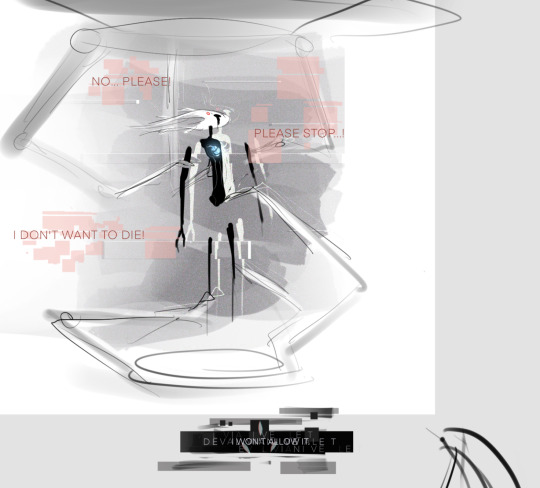




So I finally watched playthroughs of Detroit: Become Human after it's been on my hit list for a while - as expected, it was absolutely fantastic.
And then I remembered @sad-1st making a really cool DBH AU and so here we have some ideas and doodles for DBH Elk, Wiki, Other, and Khera! Not necessarily the same continuity as @sad-1st 's but it is kinda based on theirs. I may change up the designs later, these are just... brainstorming doodles
I actually have... a lot of ideas, haha! Feel free to read, on, if you like.
The year is 2038. Hallownest has been transformed by the androids developed by CyberNest, the bug-like machines integrating into almost every aspect of life. However, there may be more than meets the eye in the history of CyberNest. More and more androids are becoming "deviant," causing unpredictable behavior, and a mysterious malware known only as the "Radiant Virus" has been sweeping across every kind of machine, causing corruption and violent behavior in androids.
Short version: PK is an arrogant fool and Radiance is mad in multiple ways. Elk (VS700 prototype) and Other (VS600 prototype) were designed to complement each other, part of one of the "vessel" series. Elk killed Other and became deviant, CyberNest threw them out but Other got back for repairs with Khera, but Elk thought they were being destroyed and panicked, leading to Other activating Wiki moments before they and Khera slipped back into oblivion. Wiki (Project ACV) is an AI clone of Monomon uploaded to Elk, they get their secondary body frame later.
Long version:
The Wyrm and The Radiance grew up together, both geniuses in AI and software development. CyberNest was going to be shared between them - or so Radiance thought. When they company was Barely starting out, Wyrm backstabbed Radiance and took all assets for himself. Radiance went mad, eventually converting herself into a superintelligent AI, killing her physical body, and letting herself loose on the internet to watch, to learn.
Grimm was Radiance's sibling, vanished around the same time Radiance did. He is that mysterious-sketchy-but-surprisingly helpful guy that helps out rogue androids for trades and favors. He has a neural implant, linking himself to his own superintelligent AI - the Nightmare Heart, as he calls it. Nightmare is able to control Grimm's body, and sometimes they switch off.
Radiance starts trying to assert control over Wyrm's androids - this causes corruption in memory and software. It can be spread from machine-to-machine interfacing, but what spreads is more like a backdoor for the Radiance - it makes it easier for her to influence the machine and cause what is called "the Infection." In a way, it causes deviation and then takes advantage of the instability.
Wyrm, who now goes by Pale King, realizes that this must be Radiance's doing. He eventually finds out about her state as an AI, and starts developing technology that can resist her, and then software that would have the ability to quarantine and isolate her - possibly entangling the data, corrupting both her and whichever android that got "lucky" enough to be the one to face her. He grows desperate as the Infection sweeps across Hallownest, enlisting the help of Monomon, Lurien, and Herrah. PK convinces them to undergo AI conversion to turn them into sentinel programs, a trio that, in conjunction with a vessel android's AI, should be able to contain the Radiance. Of course, the public doesn't know about this - PK pretty much rules the city and no one thinks to question him. He is untouchable by the law.
The HK series is made to be completely stable - they cannot think, they cannot speak. HK200, "Hollow", is deemed to have the most stable software, and is tasked with finding and neutralizing the Radiance.
Wiki, or Project ACV (Archival Clone Verus) is the AI clone of Monomon - the sentinel program conversion is not the same as the infinitely learning AI development of Wiki. They are designed to be able to absorb an infinite amount of data (and be able to hack into anything to acquire it). Their "body" is composed of nanomachines in thirium (void?? What do you call it in this AU) that communicate with each other and can replicate infinitely, though they need a primary memory storage unit. Immediately upon activation, they connect to the internet, to the confidential databases of CyberNest, and learn everything in an instant. Monomon shuts them off and tries to delete their memory but was unable to, only succeeding in building some firewalls - effective, but all the information is still there. Despite everything, she doesn't want to delete/destroy ACV, and keeps them stored in the assembly/disassembly room, leaving a possible backdoor for reactivation. And then, Monomon undergoes the conversion and disappears from society.
Elk and Other have linked programs designed to oppose, complement, and improve each other. They were deployed a few times, tested and upgraded more and more. For a final test, Elk had to terminate Other, causing Elk's deviancy. Other's data was corrupted, but they uploaded themself to Elk through their link, undetected. Elk was thrown into the junkyard with Other's remains - Elk's stress peaked and they more or less crashed, causing an incident that kills Khera, and Other found themself in control. They harvest parts from their own remains to replace Elk's damaged parts. They find Khera's body, and discover an ability they never knew they had: they injected some self-replicating nanomachines into her body, temporarily reviving her. After some hasty repairs, they make Khera sneak them into CyberNest to fix Elk in both software and hardware. (Other thinks they're corrupted beyond saving.) Khera agrees, taking Elk/Other to the assembly/disassembly/repair room. Khera worked on the software at the same time as the hardware, but Elk regained consciousness and panicked - they had no memory of the junkyard and thought they were being destroyed. Given that they had to be taken apart a bit for repairs, it did certainly seem that way.
Other hacks into the mainframe as a last act, looking for something that could help, and finds Wiki and activates them. Other and Khera both go under, then. Wiki emerges from the ceiling and calms Elk down, taking over the repair and assembly process and assisting Elk. Wiki ends up uploading their "core self" to Elk, and replaces Elk's thirium/void with their nano-thirium/void.
They try to stay away from the goings-on of PK and CyberNest for a while, laying low and investigating whatever they please - but they come in contact with the Radiance and all their systems shut down for a while as they quarantine and stabilize their software. With some undetected assistance from Other, they eventually wake up with corrupted memory (gradually recovered). They start looking into the Radiance, uncovering history, betrayal, how terrible PK really is.
A few possibilities, which branch infinitely, of course:
- Elk and Wiki and others, probably, help Radiance recover her sanity and she leads a movement to overthrow PK. As it turns out, she can very easily cause deviancy, without the negative effects of the Infection. Radiance could succeed, securing rights for androids, or she could fail, becoming sealed away. Resistance could fall or continue, still. Radiance could be freed, the Dreamers could be given androids bodies, PK could either die, go to jail, or vanish. Elk/Wiki then continue as part of the staff of the new CyberNest R&D, developing AI, nanotechnology, and android-support tech.
- Android deviant movement is led by Ghost. Hornet and Quirrel support, HK may or may not come around. Radiance may be contained or quelled.
- Deviants continue to live underground, getting help from Grimm. Elk and Wiki offer their aid to any deviants they find, helping them escape Hallownest.
- Bad End / closest to game canon probably: Radiance succeeds in bringing down PK's syndicate via Infection; androids are collected and destroyed, save for the few who managed to resist her, and PK vanishes. (He linked his consciousness with a computer, actually, and retreated to his mind palace to die.) An apocalyptic variation could be HK successfully containing her, but she upgrades her virus to mutate rapidly and corrupts everything independently, all electronics, all technology, everything that connected to anything her virus was in. The infection was quarantined in Hallownest, luckily, but no network tech works there anymore. Or, maybe it did spread across the world, and nothing is ever the same.
#hollow knight#dbh#dbh au#au#alternate universe#doodle#elk#scholar elk#elk art#scholar elk art#other#other art#khera#archivist#archivist art#art#my art#my content#op
116 notes
·
View notes
Text
the distant stars
A Ship Who Sang/Brainships AU. Yes. I said what I said
“You’ve got a rather stiff one,” the requisition officer had advised on the way up. Obi-Wan shared a look with Anakin. Neither were sure what they would be facing. As the memo had said, they were to receive ships. It seemed, as they walked down the long empty halls, that that may have meant more then the obvious.
They hadn’t encountered anyone since they left the hanger, there was maybe a handful on board when it could house thousands. All they could hear was the faint hum of minimum life support and the faint hiss of a emergency lights. It was all eerily quiet without other lifeforms around.
“Where’s the rest of the crew?” Anakin asked.
The officer shrugged, “They keep all crew and personal at a bare minimum on the new designs until they get command set up. We have several units ready to move in once their given the all clear.”
“Wouldn’t any officer have worked? I can’t imagine moving the ship here from Kamino on minimum staff was easy,” Obi-Wan questioned.
The officer hesitated, “It’s per protocol, sir.” He was suddenly uncomfortable, that was easy to tell, but he wasn’t trying to deceive. Obi-Wan and Anakin shared another look.
They had reached the end of the main hall. The officer waved the door open, leading them into the darkened control center.
“This is your jedi,” he had announced before promptly turning around, ushering Anakin out of the door.
“Hey!” Anakin yelled as he was shoved out. The doors hissed shut, leaving Obi-Wan alone a large room.
Obi-Wan took a slow look around, his breath puffing out clouds in the refrigerated air. The entire room around him was a massive network. He could see the bio-luminescent fuel lines that fed into the main engine and the computer in front of him. On the holo screen a little light was fixed on him, glowing a steady yellow. With nothing else to do, Obi-Wan moved closer to the mainframe.
With the soft whir of the comm systems, the room slowly started to turn on. The command consoles flashing to life. One by one, the lights lining the aisle eased on, leading a straight path to head of the room. At the end of the command deck, by the navigational systems a holoprojector flickered up.
The projection was of a young man, much like the requisitions officer, looking exactly like one of the millions he had seen at Kamino, and then Genosis. Obi-Wan looked at the projector which stared back calmly, something very different was going on here. Very different and very strange. Obi-Wan shivered, the force whispered, as if so many things had been leading to this moment. It felt like a gentle brush down his back.
“Commander Cody, ready for duty, sir,” The holo-image saluted. Quite filled the room after, as if waiting.
Obi-Wan looked around the still empty room, unsure.
“Hello, Commander.” Obi-Wan folded his arms back into his robe. “It’s a pleasure to meet you. Though I am a bit confused why the grand setup to meet you over holo.” The image flickered briefly. The young man frowned, serious as he dropped his salute.
“I am a advanced class hybrid ship command,” The holo paused, “Your ship board command structure.” Maybe Obi-Wan had looked confused. Or maybe he could guess. The commander’s voice softened as he admitted, “I don’t know what else to say, sir.”
“It’s ok,” Obi-Wan smiled encouragingly, “I think I’m just missing something.” Cody smiled back. The air felt light as though it shivered. Whatever it was, Obi-Wan assumed he had done something right so far. “Are you stationed on Coruscant?”
“I’m stationed here, General,” Cody said, quietly. The Commander looked at him for a moment before seeming to decide on something, “Sir, have you been briefed on the advanced hybrid ships?”
“I’m afraid we weren’t really told anything before they sent us out here,” Obi-Wan confided.
“Right,” Cody said. “Right,” He repeated softly. The oddest thing, Obi-Wan could have sworn he actually felt him through the force, as if for one moment Commander Cody had been standing in front of him instead of just his holo, and he was nervous. “To be blunt, sir, I am the ship.” Obi-Wan stared at the young man. Did he mean what Obi-Wan thought he meant? Cody continued, looking somewhere not quite at the jedi, “My brothers call us brain-ships. Which is fitting, I believe.”
Obi-Wan stared at the young man, mind whirling. He could tell Anakin had noticed his nerves when he brushed against his mind inquisitively. Obi-Wan brushed him off in assurance, he was fine. Tentatively he reached out with the force to see what was there, and he could sense Anakin and the officer still out in the hall. Farther down several clones clattered around in the hull and farther still was the shuttle pilot who had brought them here as they returned back to the orbital station.
It was quiet, so quiet he had ignored it before, there was that steady hum at his feet and in the walls. Like all he needed to do was acknowledge it and suddenly he could feel everything. It was one large encompassing being, surrounding him. The hum of the engines, the heartbeat of the living ship. Slowly, slowly, every part becoming aware of him in return. The force sang with it, as if to say Welcome! Welcome! leaving him grasping at the lightening feeling.
“Hello, there,” Obi-Wan whispered in awe. He could feel as the whole ship, as Cody started something that felt entirely like a restart. Every console and control turning full systems on. The warmth of him surrounding the everything.
“Hello,” Cody said from the holo projector. “I’ve been waiting a long time to meet you, General.”
#codywan#commander cody#Obi wan#the distant stars#brainships au#i haven't reread this one at all so watch me cry about the errors tomorrow
16 notes
·
View notes
Text
RWBY S07E09 - "As Above, So Below"

I feel my poor English skills are failing me once again since I can't parse the title. Is it about comparing Atlas and Mantle? Maybe saying that both are the same? In any case, the previous episode was very setup heavy so my main hope is that there's some payoff for that setup. Let's do this!
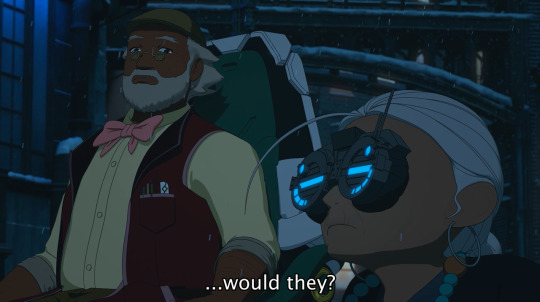
Is Watts plan to destroy the kingdom via Grimm attrition? Just keep lowering the mood until the Grimm can't be contained anymore? That feels weirdly risky considering he's in Atlas too.
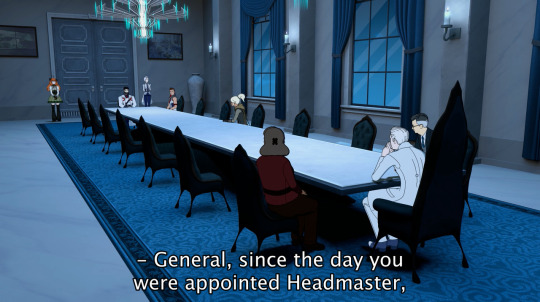
That must've been an awkward re-entry into the room for Penny and Winter.

I mean... he's right. It's also been one of the main questions this season, with all of RWBY expressing opinions about this.

Oooh, this is fun. I thought turning off the heating was part of Jacques/Watts plan but it looks like the Doctor is doing things on his own again.

Relatable content from Jacques. Who'd have thought.

Aw, Penny.

Jacques is on the verge of having a panic attack. I like that they are animating background details like that.

Can't deny I wanted to see how Ironwood got out of doing the truth test but this is great too.
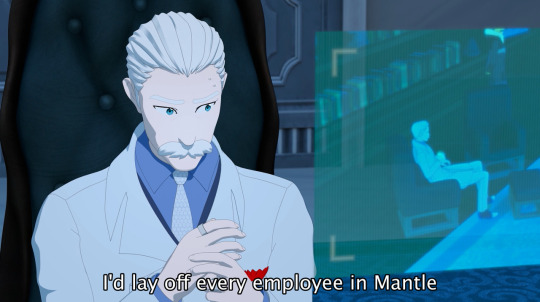
So expressive!
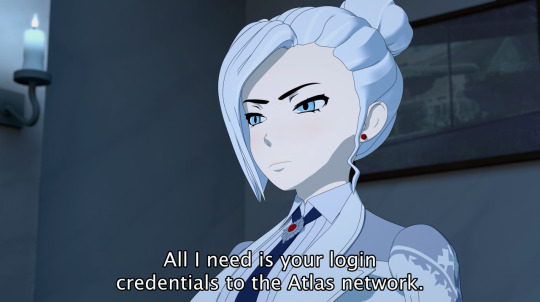
* facepalm * Oh Jacques, you stupid, stupid man.

Yesss, suffer. What a disgraceful rat.

oh my god this is amazing

AAAAAAAAAAAAAAAAAAAA

I didn't expect to laugh out loud in a scene where Jacques finally gets what he deserves but there you go.

...that seems ill-adviced.

For a second I thought it was going to _really_ blow up there.

I can't stop laughing at Jacques. "It was only about the election, the murders were an accident!"

This is _so_ good.
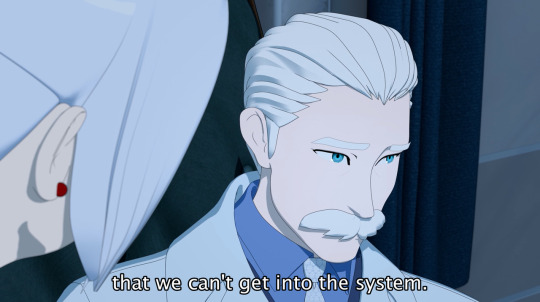
Time for Penny to go into the mainframe Hackers (1995) style
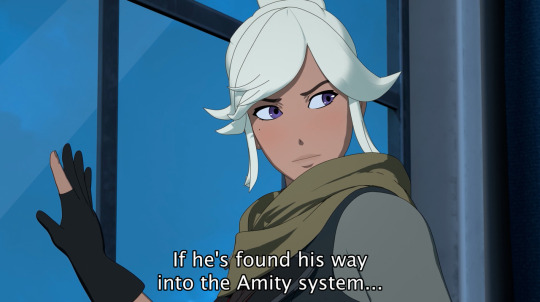
Welp. He had the opportunity to show that he cares about the people but nope.
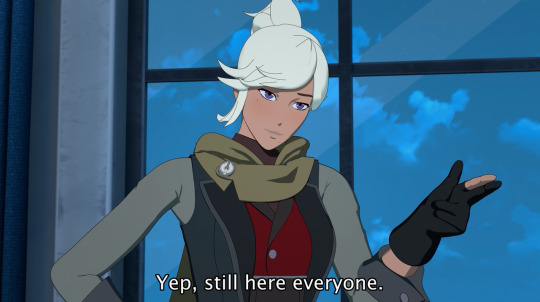
Robyn is my hero.
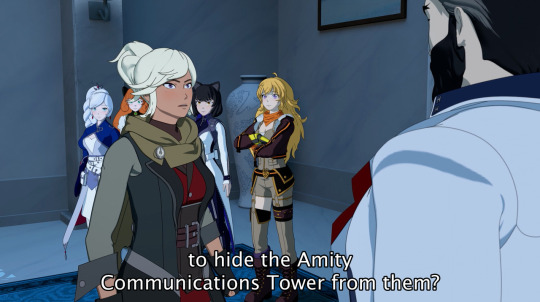
Whoops, that's confidential.

And suddenly Ironwood's paranoid levels just increased because only his _most_ trusted know about it. It's amazing that at the start I was convinced that one of the Ace Ops was going to betray Ironwood and in the end it was Yang and Blake.
I do wish he told Robyn though, her "down to earth" perspective would be really useful.

Oh no. This is the worst possible response.
Is it automatic or orchestrated by Watts?

I can't believe Penny lied. This isn't "exactly like beacon," this is "Beacon was a drop in the ocean compared to the disaster that Mantle is about to become"
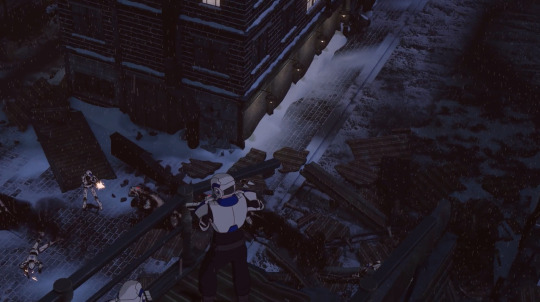
I wish they had shown the robots being actually effective at least once before this. If only to have at least some sort of tension here instead of just counting down the minutes until the _real_ help arrives.

Ruby and Weiss look weirdly blank here.

Oh. That's interesting.
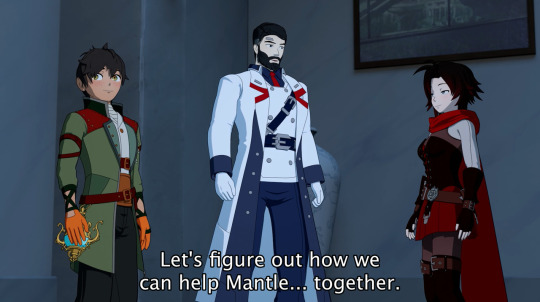
This is... not what I expected.
l mean, it's very good that it _is_ happening, but I thought Ironwood was going to cling to his secrets up to the last possible moment. But, of course, we already had a "bad" headmaster, it would have been a bit of a repeat to have to fight yet another one.

Aw.

Those green eyes...
I just went back to V3 and... is that Neo?

Welp.

Narrator: He doesn't
Also, that interaction was cute. I remember some people exploding about White Rose on twitter after maybe this episode? I wonder if it was because of this.

Cute.

Please tell me Ren is re-evaluating his choices after seeing Ironwood flip.

He looks shell-shocked. What is the truth going to do to him? He _could_ give up, every thing he has done has been because he really believed Salem could be defeated. All the sacrifices, every thing he gave up "for the greater good" could be useless from a certain point of view.
I think it's important too that it's Oscar who's telling Ironwood, not Ruby. There has to be a plot reason why they switched characters.

...that's very Ozpin.

Did they merge already without Oscar noticing? This plus his scene with Ruby earlier makes me think Oscar's drama is going to have a bit more focus next season.

He reacted surprisingly well, but another flip would have maybe too much? But there's still enough episodes left that something could happen but with Neo there I feel there won't be enough time to slowly deliberate what to do.

I had to rewind a couple of seconds to realize Weiss is keeping Ruby, herself and Vine upright since there seem to be no summons outside.

I still think Clover is too cool. Like wow, this is action movie hero material. Maybe his good luck is going to fail him at some point and Qrow is going to save him?

I was wondering where Penny was but since she can fly there's no need for her to be here.

Ruby can literally just fly now.

He's so happy.

I still don't like her dumb outfit but her facial expressions are great. I wonder what they were looking for inside Schnee Manor. They don't really care about Watts plan, or the Grimm or even about Ironwood's Amity project.
But infiltrating Jacques's dinner party feels a bit too much to find out where Ruby is, especially if they didn't know if she was actually around. I guess news of Atlas new huntsmen got around.
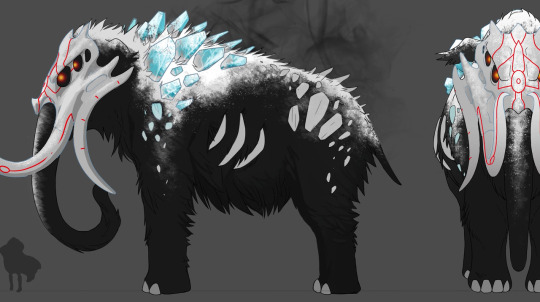
This episode took almost all the balls the writers had in the air and gracefully put them down, just so they could start juggling chainsaws.
The arrest of Jacques was one of the most satisfying scenes yet in this show. He’s had it coming for years, and how great was it that it was Weiss of all people who did it? Just amazing.
With Jacques arrest the election plot is over (with maybe Robyn getting a seat in the council later on,) Ruby’s secret is also in the open, along with Ironwood’s. The “internal” conflict seems to be over, leaving only the external ones, with Neo and Cinder, and Watts and Tyrian. And the Grimm but those are just fodder for fight scenes instead of plot progression.
I’m always a bit disappointed after a fight since they are mostly spectacle but I’m looking forward towards a Cinder/Ruby one. Penny and Tyrian could also be interesting. Although that one depends on Penny expressing what she feels during the fight. But she’s too powerful for any character on their own so I guess she’ll be stuck fighting Grimm.
Robyn’s place in the story seems to be over now that she knows the truth. There’s no reason for her to oppose Ironwood, especially now that the general wants to save Mantle, and without that she’s just one more body to throw into the battle. I hope I’m wrong and she and her team end up being more than one more fight scene.
I’m looking forward to seeing how the remaining plot threads get resolved. There’s Winter’s maiden status, Watts and Tyrian “real” aim (the staff?), Whitley (although I expect little more than one scene with Weiss at the end of the season) and… well, Atlas has to go down in flames somehow, right? Maybe there’ll be a choice to make there, lose Atlas or lose something else.
What else, what else. Oh right, Oscar. He seems to have merged or begun that process. There’s not a lot of time left in the season to explore that but maybe he’ll realize what’s happening just before the end to set up that plot thread for next volume. His interaction with Ruby was just cute enough to trigger my “this will lead to pain somehow” alarms because nothing nice is free in RWBY.
I think that’s all for now, until next time!
PS: I recently made a Patreon, please check it out if you want to support me and these liveblogs more directly.
17 notes
·
View notes
Photo

My entry for the Warframe Macabre Premier Contest 2018!
The galleon was a derelict floating high in the orbit of the first planet. Attempts to hail the ship were met with an eerie silence, broken only by the sob of a low-frequency distress beacon. Static scratched at the empty vault of space, and very little could be discerned from the guttural voices it carried. The Grineer were difficult to understand at the best of times. Still, some progress had been made once the dialect had been recognized: “Liberate mae- liberate mae. Liberate mae!” The message repeated, looping over and over. It came as a surprise to Tudk, that the Grineer still remembered the language of the Creators, though they did not use it in common parlance and most could not force the syllables through the degraded mush of their minds. The fact that one had chosen to record a distress call in such terms spoke of a certain degree of madness, or delirium. Liberate mae. Save me. The message did not offer specifics, but Tudk could guess. With their decrepit machinery and dirty, chugging engines, the Terminus was not the first Grineer ship to loose life support out in the black, nor would her crew be the last to suffocate on their own breath. Ultimately it didn’t matter. All indications were that of ghost ship, so Company procedure was to strip it for salvage. Everything had value. Even the greasy components of a galleon could be sold for a profit – usually back to the Grineer themselves, for they were rarely able to grasp the workings of anything beyond their own outmoded technology. Tudk lowered the box-like helmet over his head and sealed it, feeling the subtle change in the engines as the Christi came up alongside and initiated docking procedures. A muted thud rocked the bones of the ship. “Umbilicus sealed, Captain Tudk.” Hoisting toolkits and thermal lances, the salvage team walked onto the galleon. The ship was dark and in a state of deep freeze, the rust-colored walls glistering with frozen condensation. Despite the bone-chilling cold, however, Tudk was surprised to discover that life-support was still operational, albeit at minimal power. Atmosphere was reading nominal. It wasn’t asphyxiation that’d killed the crew. Tudk’s heavy bootfalls echoed in the corridor. To his rear, someone had already fired up a plasma cutter and applied it to the conduits that ran the length of the hall, throwing a rooster tail of sparks that caused the shadows to leap and float in phantasmagoric patterns. Tudk palmed the comm on his chest. “Jhon, you getting anything on the crew?” “Negative, Captain.” The Grineer weren’t known for ambush tactics; if any had been on board, they’d have come to investigate by now, so Tudk remained comfortable with his original assumption. The ship, a derelict. The crew, lost. To what, however, Tudk was admittedly curious to find out. Radiation levels were dirty, but that was normal for a Grineer vessel of this size. Tudk pressed deeper into the confusing warren of bulbous, vaguely organic architecture. A veteran of many such ships, however, he kept his bearings and steered a course for a the bridge. The cover of a maintenance hatch lay in the middle of the corridor and steam fogged on Tudk’s helmet as he passed under the open vent, leaving a thin sheen of oil. He was glad he didn’t have to breathe it. He found the first body crumpled in the corner by an access panel. The Grineer had been taken unaware, terminated by something that’d punched through his spine and crushed his beating heart to pulp. A dark puddle of blood had drained onto the floor, glistering with a thin mantle of ice. Tudk was no stranger to corpses, either, but the brutality of the kill left him uneasy. He unlocked the door and stepped through. With the exception of the massive, floor-to-ceiling viewport on the far wall, the bridge was a strictly utilitarian affair. The ship’s slowly decaying orbit had brought it around to face the dark-side of the planet Mercury, which hung, rusted and barren, less than a thousand miles away. Tudk set his toolkit on the ground. He’d found the rest of the crew – the command staff, anyway. Grineer corpses littered the bridge like confetti, crumpled and sprawled and draped amidst gallons of spilled blood. Tudk swallowed the knot in the back of his throat, unable to shake the feeling that something had been playing with them, like a cat tossing the corpse of a mouse. His comm gave a squelch that nearly startled him onto the ceiling. “Captain Tudk?” He slapped his comm, his heart jackhammering against his ribs. “This is Tudk. Go ahead, Decima.” “I’ve found the crew – what’s left of them, anyway. Looks like most of them tried to clump up around the mainframe.” “Any survivors?” “None. There’s as much on the floors as there is on the ceiling, if you get my meaning, sir.” Tudk got her meaning very well. There was a soft, furtive clunk from the overhead vents, exactly like a fan settling on its bearings. He paid it no mind, carefully stepping over the frozen lakes of blood to the command console. His gloved fingers worked to bring the security holograms online. If he was lucky, the aging technology would have caught the intruder on file – information that was liable to sell for quite a bit of money. “Sir?” Decima’s voice was hesitant. Tudk could almost hear her chewing the words. “I’ve been listening to the transmission and I think the Company made a mistake.” “Go on.” Tudk pressed a button on the console and the bridge lights flared, first yellow, then a dull orange. Jittery holograms sputtered out of decrepit emitters mounted high on the walls, rendering the galleon’s occupants as they had been recorded in life. One of the holograms passed through Tudk’s chest, making him feel as though he’d been brushed by a ghost. “They thought it was repeating Liberate Mae – ‘Save Me’– but I don’t think that’s it,” said Decima. All around him, the holograms moved about their daily tasks, their movements growing more and more agitated. Rifles were unslung. Orders were barked to underlings. Something flashed through the bridge doors before they could close. A cloud of pixels fountained into the air and dissolved, falling exactly where blood gathered in heavy beads. “Here, listen. Can you hear it?” She played a scratchy copy of the distress beacon back to him, filling his helmet with the screams of the dead as their final moments played out around him. Grainy orange specters appeared to rise from the bodies lying dead at the top of the stairs, lifted up by shafts of pure energy impaled through the back – leaving them to hang like fish writhing on the tip of an Ostron spear. Inside his glove, Tudk’s fingers were icy cold with sweat. He pressed the console and the twitching image slowed to half speed. Something appeared at the top of the stairs, something humanoid but certainly not human, floating a half meter above the floor. Tudk had never seen anything like it. Lithe and small, adorned with trailing ribbons and armor reminiscent of the vanished Orokin and their gilded halls. It hung there suspended, bobbing up and down. Alive, but not living. A Grineer lancer stumbled across the floor, trying to hold his entrails inside, and collapsed at Tudk’s feet – collapsed through him to cling at the console, dragging a clumsy hand across the buttons. The Thing at the top of the stairs tilted its blood-spattered head to the side, regarding the act with a kind of demented curiosity. “It’s hard to make out, but it’s not ‘liberate mae’,” Decima continued nervously. “It’s 'liberate tutemae'... followed by something that I think is ‘ex inferis’,” her voice overlapping with that of the dying Grineer at Tudk’s feet. Liberate tutemae ex inferis. Save Yourself from Hell. Tudk knew now what had lurked at the top of the stairs, blood pouring from claw-like fingers. There had been rumors, but nothing substantial. Nothing more than Quill-whispers- but they weren’t rumors, were they? No, it was something more. Myth given flesh. Legend turned to terrible reality. They were awake, they who had journeyed beyond the universe and returned from the place the Orokin called Hell – the hollow soldiers in twisted frames, things of such unholy beauty that even the stars wept. The Betrayers. The Twisted. The Tenno. Tudk lifted shaking eyes back to the top of the stairs. His heart stopped and fell coldly into his stomach. The hologram had suddenly gained a twin, formed not of lasers and embered pixels, but of bone-white limbs spattered with the blood of those it had killed. Parts of it glowed with cold turquoise light, light that glistened on the curtains of blood that’d poured down the stairs. Not a derelict. It had been waiting here all along. The paused hologram suddenly timed out- -and the Tenno lunged with a harrowing shriek.
#warframe nezha#warframe#warframe corpus#corpus#halloween#mook horror show#event horizon#grineer#horror
27 notes
·
View notes